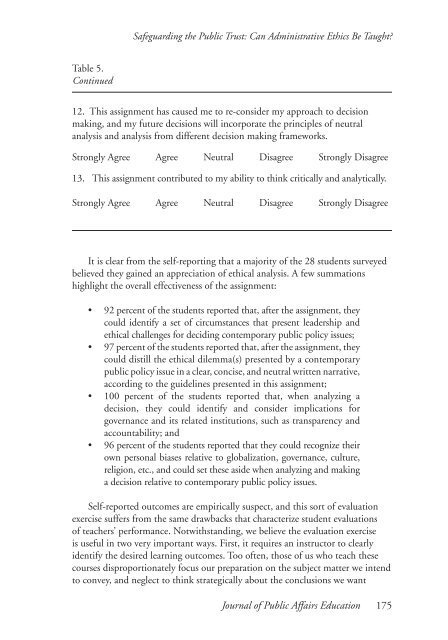Safeguarding the Public Trust: Can Administrative Ethics Be Taught?Table 5.Continued12. This assignment has caused me to re-consider my approach to decisionmaking, and my future decisions will incorporate the principles of neutralanalysis and analysis from different decision making frameworks.Strongly Agree Agree Neutral Disagree Strongly Disagree13. This assignment contributed to my ability to think critically and analytically.Strongly Agree Agree Neutral Disagree Strongly DisagreeIt is clear from the self-reporting that a majority of the 28 students surveyedbelieved they gained an appreciation of ethical analysis. A few summationshighlight the overall effectiveness of the assignment:• 92 percent of the students reported that, after the assignment, theycould identify a set of circumstances that present leadership andethical challenges for deciding contemporary public policy issues;• 97 percent of the students reported that, after the assignment, theycould distill the ethical dilemma(s) presented by a contemporarypublic policy issue in a clear, concise, and neutral written narrative,according to the guidelines presented in this assignment;• 100 percent of the students reported that, when analyzing adecision, they could identify and consider implications forgovernance and its related institutions, such as transparency andaccountability; and• 96 percent of the students reported that they could recognize theirown personal biases relative to globalization, governance, culture,religion, etc., and could set these aside when analyzing and makinga decision relative to contemporary public policy issues.Self-reported outcomes are empirically suspect, and this sort of evaluationexercise suffers from the same drawbacks that characterize student evaluationsof teachers’ performance. Notwithstanding, we believe the evaluation exerciseis useful in two very important ways. First, it requires an instructor to clearlyidentify the desired learning outcomes. Too often, those of us who teach thesecourses disproportionately focus our preparation on the subject matter we intendto convey, and neglect to think strategically about the conclusions we wantJournal of Public Affairs Education 175
Safeguarding the Public Trust: Can Administrative Ethics Be Taught?students to reach and the skills we want to impart. The creation of an evaluationinstrument forces us to prepare for the classroom by considering what outcomeswe are aiming for, and by identifying what information and skills we want thestudents to acquire during the semester.Second, the feedback gained from student responses permits us to “test” their(admittedly subjective) perceptions about those outcomes against our intendedresults. In cases like this one — where the student responses appeared to reinforcethe value of the assignment in terms of producing the desired outcomes — theinstrument can assist in fine-tuning subsequent curricular choices, classroomdiscussions, and assignments. It allows the instructor to see areas of relativestrength and weakness, and to respond appropriately.In this case, students’ responses suggested that additional time should bespent reviewing specific ethics codes, and on learning the tenets of deontology.Specifically,• 7 percent of students did not believe they could identifyprofessional and organization-based ethical codes and laws(international, national, state, and local) that are relevant todecision making, and apply these appropriately and in anunbiased way to contemporary public policy issues; and• 7 percent of students reported that they could not identify andacknowledge the principles (justice, equity, fairness, respect,dignity, etc.) embodied in the deontological approach todecision making for contemporary public policy issues.ConclusionWhile the field still lacks a consensus on the appropriate approach toteaching ethics, two things are certain: First, the changing nature of the publicsector has brought new challenges to governance and ethical decision making.While ethical training was difficult to operationalize in the past, it seems evenmore challenging now. We have reported here on an approach to bring currentthe pedagogy of ethics, in order to reflect the evolving nature of the sector. Itbuilds on the Walton, Stearns, & Crespy (1997) framework, acknowledgesand adheres to our Constitutional foundations, and is consistent with both thecurrent ASPA Code of Ethics and the NASPAA Code of Conduct.Furthermore, regardless of our diverse perspectives, there is one normativebasis we all must agree on: We are obliged to teach with a “healthy respect forthe Constitution and law” (ASPA, 2009). The success of that task ultimatelymust rest upon the level of civic competence that students bring to theethics classroom. This is because administrative ethics ultimately rest uponConstitutional competence (Rosenbloom, 1992). As John Rohr has persuasivelyargued, ethics must be understood within a regime framework (1989). This176 Journal of Public Affairs Education
















